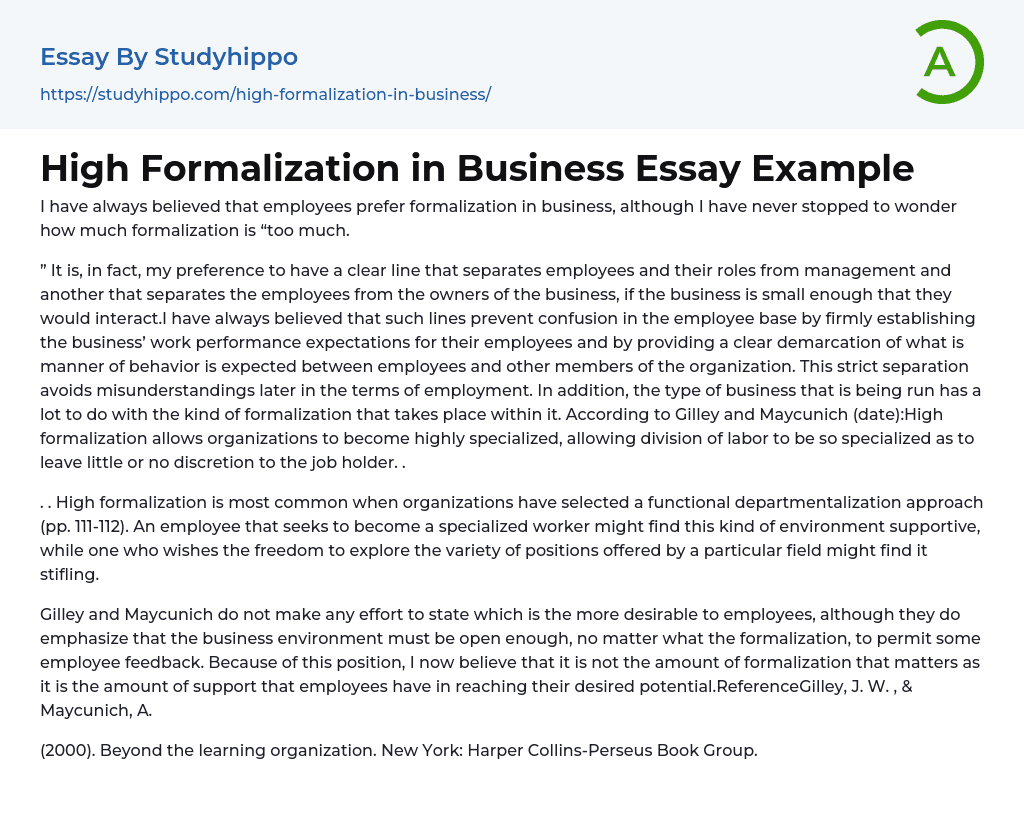I have always believed that employees prefer formalization in business, although I have never stopped to wonder how much formalization is “too much.
” It is, in fact, my preference to have a clear line that separates employees and their roles from management and another that separates the employees from the owners of the business, if the business is small enough that they would interact.I have always believed that such lines prevent confusion in the employee base by firmly establishing the business’ work performance expectations for their employees and by providing a clear demarcation of what is manner of behavior is expected between employees and other members of the organization. This strict separation avoids misunderstandings later in the terms of employment. In addition, the type of business that is being run has a lot to do with the kind of formaliz
...ation that takes place within it. According to Gilley and Maycunich (date):High formalization allows organizations to become highly specialized, allowing division of labor to be so specialized as to leave little or no discretion to the job holder. .
. . High formalization is most common when organizations have selected a functional departmentalization approach (pp. 111-112). An employee that seeks to become a specialized worker might find this kind of environment supportive, while one who wishes the freedom to explore the variety of positions offered by a particular field might find it stifling.
Gilley and Maycunich do not make any effort to state which is the more desirable to employees, although they do emphasize that the business environment must be open enough, no matter what the formalization, to permit some employee feedback. Because of this position,
I now believe that it is not the amount of formalization that matters as it is the amount of support that employees have in reaching their desired potential.ReferenceGilley, J. W. , & Maycunich, A.
(2000). Beyond the learning organization. New York: Harper Collins-Perseus Book Group.
- Accounting essays
- Marketing essays
- Automation essays
- Business Cycle essays
- Business Model essays
- Business Operations essays
- Business Software essays
- Corporate Social Responsibility essays
- Infrastructure essays
- Logistics essays
- Manufacturing essays
- Multinational Corporation essays
- Richard Branson essays
- Small Business essays
- Cooperative essays
- Family Business essays
- Human Resource Management essays
- Sales essays
- Market essays
- Online Shopping essays
- Selling essays
- Strategy essays
- Management essays
- Franchising essays
- Quality Assurance essays
- Business Intelligence essays
- Corporation essays
- Stock essays
- Shopping Mall essays
- Harvard Business School essays
- Harvard university essays
- Trade Union essays
- Cooperation essays
- News Media essays
- Waste essays
- Andrew Carnegie essays
- Inventory essays
- Customer Relationship Management essays
- Structure essays
- Starting a Business essays
- Accounts Receivable essays
- Auditor's Report essays
- Balance Sheet essays
- Costs essays
- Financial Audit essays
- International Financial Reporting Standards essays
- Tax essays
- Accountability essays
- Cash essays
- Principal essays




